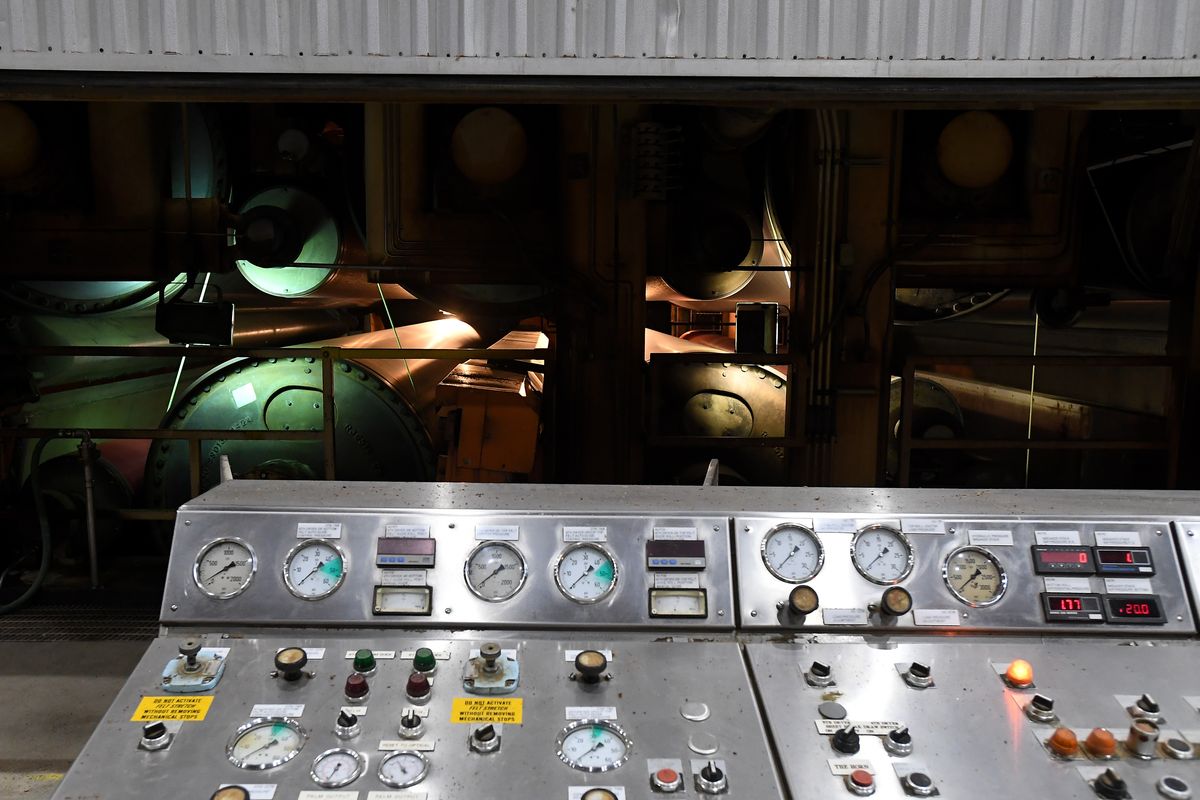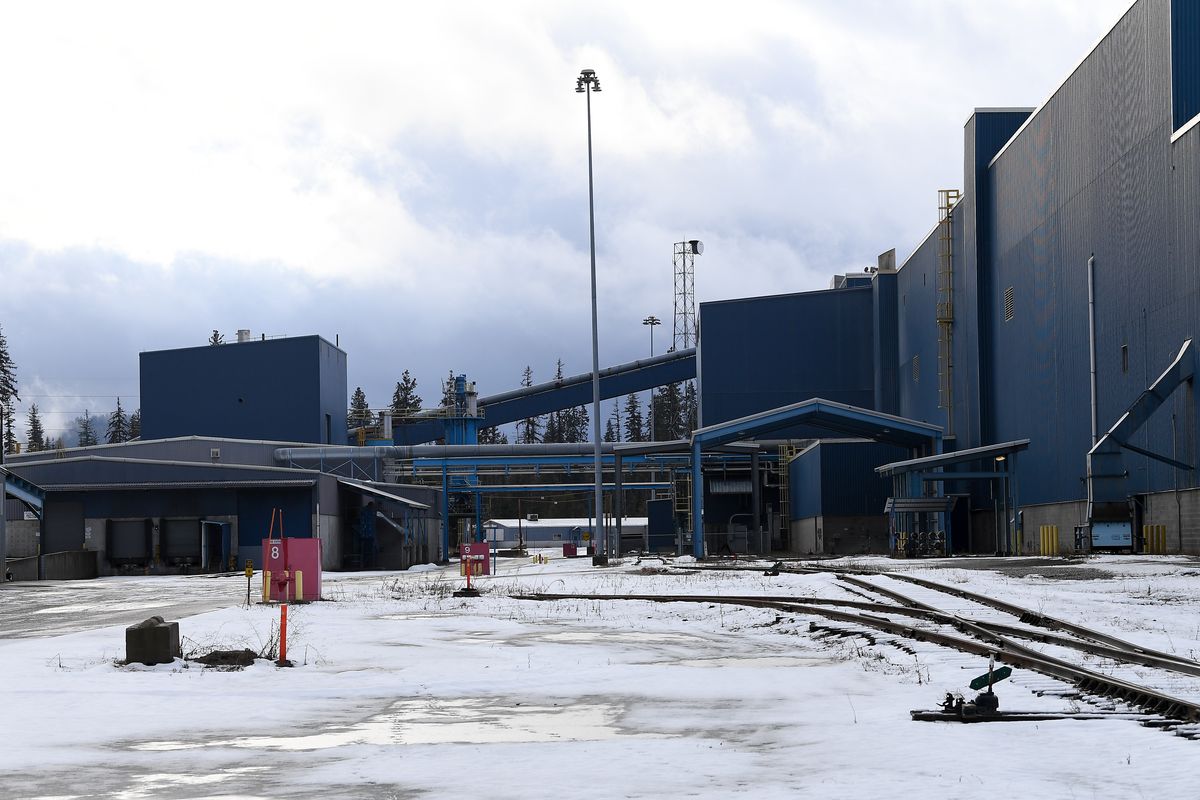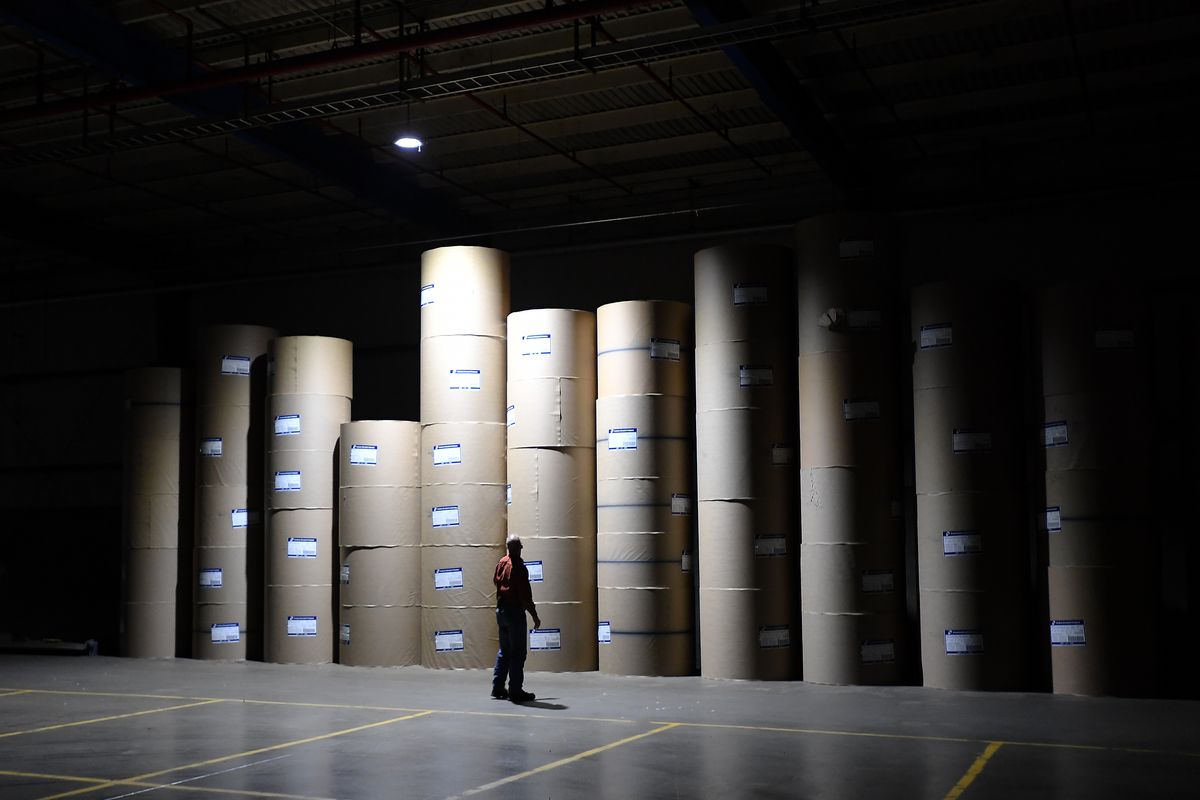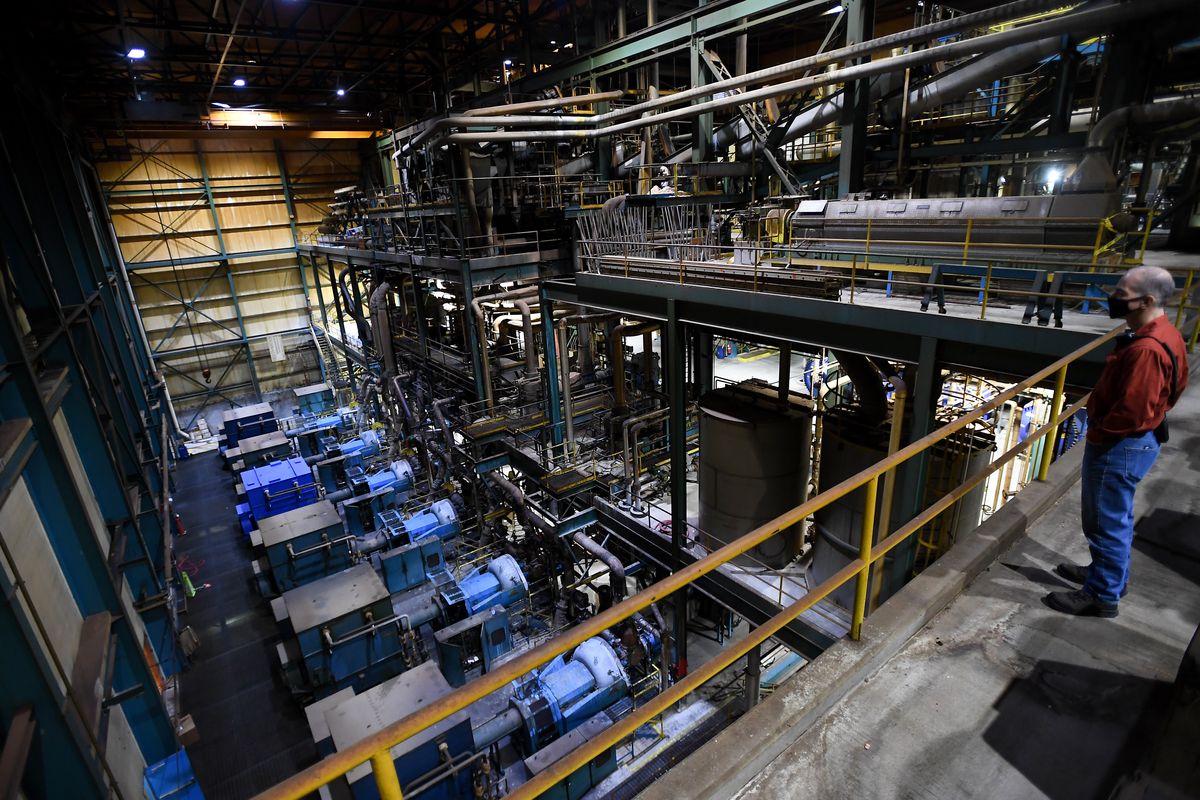Laid-off employees of Ponderay Newsprint are running out of time and money
The Ponderay Newsprint Mill features rail access and substantial infrastructure seen during a tour of the closed facility on Thursday, December 17, 2020, in Usk, Wash. (Tyler Tjomsland/THE SPOKESMAN-REVIEW)
USK, Wash. – After being told to go home and not return to their jobs at the Ponderay Newsprint Company mill near Usk, north of Newport, in June, the 148 employees, from trainee to company president, have been taking different steps to safeguard their futures.
While those involved with the bankruptcy settlement have focused on the value of the massive newsprint-making machinery, 29 buildings totaling 326,000 square feet and 927 acres of land, the human toll of the closure in a community with few industries has taken a back seat.
With unemployment benefits ending the week of Dec. 13, those who haven’t found jobs or retired are asking what’s next.
“We are all hoping, waiting for something every day,” said Spencer Mullaley. The 30-year-old worked at PNC in operations for 10 years. He and his wife are raising four young children in a home they purchased near the mill. They both grew up in Pend Oreille County, where their parents still live.
Todd Behrand, Interim Mill Manager of the Ponderay Newsprint Mill gives a tour of the closed facility on Thursday, December 17, 2020, in Usk, Wash. (Tyler Tjomsland/THE SPOKESMAN-REVIEW)
One of the options Mullaley and others said they would like is retraining. But even that is uncertain.
An application to the U.S. Department of Labor for certification under the Trade Adjustment Assistance program sent June 26, the day the company filed for Chapter 7 bankruptcy, is moving unusually slowly.
TAA would bring thousands of dollars for training, salaries, medical and relocation for up to two years. The program has more to offer than any of the short-term state assistance programs.
The federal program provides aid to workers who lose their jobs or whose hours of work and wages are reduced as a result of increased imports.
Different steps
Of the 148 former PNC employees, approximately 73 were in operations, 25 maintenance, 30 management and 20 electrical/instrument technicians. When the mill opened in 1989, there were more than 200 workers.
Mullaley graduated from Newport High School and from the Avista/SSC lineman school before being hired at PNC. Since being laid off, he has collected unemployment and helped his wife, who is also unemployed, take care of their three children.
The house they own is near the Pend Oreille River, just a few miles from the PNC mill, which is owned by Lake Superior Forest Products, a subsidiary of Quebec-based Resolute Forest Products, and five major U.S. publishers. His father works at an Idaho sawmill and his mother is a hairstylist.
Like many of his fellow employees, he has always been drawn to fishing, hunting and other outdoor activities near his home.
His wife, Nyssa, graduated from Cusick High School. Her father worked at Ponderay for over 25 years and is now part of the maintenance crew hired until it sells.
Mullaley started at the entry level and worked his way up. He said he is fortunate because he has saved enough through the company 401(k) plan to cover his mortgage for a while, and is eligible for state medical insurance. He will look for another job if the mill doesn’t reopen.
Employees also received severance pay ranging from about $5,000 to $20,000 based on years worked. Those employed before 2008 were covered by a company-backed pension plan that will pay those employees eligible for retirement for life based on years served and last salary.
“I really don’t have anything good to say about Resolute – they just said goodbye,” Mullaley said.
When asked if he would be interested in training for another job, Mullaley said: “If it’s paid for and I get paid to do it, yes. I’m interested in the electrical field.”
He said the local job market at the pay levels he got are “pretty slim.”
Mullaley worked on the winder crew at the end of the paper machine, where over 20-foot-long rolls of newsprint 4 feet in diameter were assembled. Then the rolls were cut to order and moved to shipping areas.
“I loved it,” he said. “It was like a second home. Enjoyed everybody.”
The past few years, job security was threatened at the mill because of several factors, from declining newsprint demand, publishing partners’ financial weakness and, ultimately, the coronavirus pandemic. Mullaley’s department went from a four-man winder crew to three, then were told to make do with two. When operating, the mill ran 24/7.
“Not lots of jobs for paper mill operations,” he said. “A couple people went to the West Coast.”
PNC offered some of the highest-paying jobs in the county. Wages started at $15 to $17 per hour, but quickly increased after gaining skills to $20 to $30. Those in management and other skilled jobs made much more and were competitive with larger cities. Before the market slowdown from the declining demand, many of the senior operations workers could make six-figure salaries with overtime.
“Good pay for around here, ” Mullaley said. He had recently been promoted to the top pay level in operations.
The annual PNC payroll was almost $14 million. Another $30 million was spent annually for contractors, maintenance, security and trucking. This is in a county where total payroll is only about $140 million, with fewer than 5,000 in the work force. The average annual income in the county is about $46,000, compared to almost $60,000 statewide.
Mill kept ready
Mechanical engineer Todd Behrend, 55, worked 28 years at Ponderay Newsprint Co. He is leading the crew that is watching over the closed mill until it is sold through the bankruptcy court.
He says the part-time job is to oversee about 12 people who run the main paper machine periodically, keep one boiler going for heat so things don’t freeze, and monitor environmental protection systems and security.
He and his wife, a math teacher at Newport High School, live in Newport. Like many employees, he doesn’t want to leave the area where they raised their three children.
Some employees have taken jobs out of the area, he said. Others have retired.
“People with trade skills were placed immediately,” he said. “But many would like to come back if jobs were available.
“Some choose to wait and see if the mill reopens,” he said.
Behrend said he isn’t actively looking yet, but some job headhunters have contacted him. The jobs are in California or the southeast.
From what he is being told by the bankruptcy trustee, a decision on the sale of the mill will be made early in the new year. The trustee recently hired a commercial real estate company to market it and have at least one bid for $11.5 million. The Kalispel Tribe made a $6 million bid that was rejected and now say they are not making another.
Behrend said people are touring the facility and employees are trying to keep it in good condition.
Some have been interested in scrapping the machinery and selling it. The commissioners from the Pend Oreille Public Utility District, county and Port of Pend Oreille have sent letters to the bankruptcy trustee expressing their concerns about the negative impacts that scrapping the mill would have on the economy and local jobs.
Since startup
Dan Tiede, 55, has worked for Ponderay since startup in 1989. He had worked for Inland Paper’s newsprint mill and lived in Spokane. His two sons were also working at the mill.
He plans to take early retirement, thanks to his investments and being part of the company’s pension program. He lives in Pend Oreille County.
“It all happened fast,” Tiede said of the closure. He, like all the others, thought that after a two-week curtailment they would start up.
He had worked as a union representative since employees voted to establish it for operations. The mechanical and electrical/instrument unit did not unionize.
Although he didn’t feel the sudden unplanned closure was right, he said that the company did pay final employee paychecks.
Environmental systems secured
Laura Verity, 40, worked seven years for Ponderay Newsprint as the environmental systems manager.
She and her husband have three young children and live in Newport. Her husband has always been a stay-at-home dad and is continuing that role.
She is part of the team overseeing the shuttered mill, doing required environmental reports so their many federal and state permits are current. And, like others, she is trying to keep the mill ready for a new owner.
She has taken another position as an industry business adviser with a national company that allows her to work from home. But she said she might consider returning.
“Have to get out of the mindset that even if reopened, it’s not going to be Ponderay Newsprint,” she said.
Job found at sawmill
Chance Hargrove, 33, worked at PNC in operations for five years. His father had moved to the area to work at PNC when it opened and retired before the closure.
Hargrove took an entry-level operations job at a Priest River sawmill a few weeks after being laid off and had also been offered a job at another sawmill.
“I miss my Ponderay job and the friends there,” he said. “I enjoy the sawmill job, but it’s more physical, where the Ponderay was more complex.”
Hargrove said there wasn’t much help with job searches or training after the closure was announced.
“The human resources guy was heading to another job the week it closed,” Hargrove said.
Federal help slow
The Association of Western Pulp and Paper Workers Union filed the TAA application that normally gets a response in six weeks – that should have been September for PNC, Bill Messenger said. He works for the Washington State Labor Council, which contracts with the state to apply for TAA.
He has filed many of these requests for manufacturing workers around the state and seen them move faster; most recently, the Georgia Pacific mill in Camas was approved.
Messenger submits the information to the DOL investigators to show that the closure was due to foreign competition.
In their application to DOL, the union stated that when Resolute Forest Products, one of the partners, severed the PNC relationship they took customers and production with them to their Thunder Bay, Ontario, plant, leaving Ponderay unable to compete.
Because it is taking longer than usual, the offices of Rep. Cathy McMorris Rodgers, R-Wash., and Sen. Maria Cantwell, D-Wash., have been looking into it, he said.
One of the problems with the application is that the company and its former owners aren’t responding to requests for information, Messenger said.
Resolute, a Canadian company, owns newsprint mills in Canada that supply a large percentage of the newsprint in the United States. They went from managing partner with majority interest to just partner, then pulled out of any interest in the company. The other partners are major U.S. newspaper publishing companies. Months before bankruptcy filing, they also gave up all interest in PNC.
“DOL needs proof that business went to Canada,” Messenger said.
“Many pulp and paper mills have been certified lately; DOL is sitting on a lot,” Messenger said.
“Everybody acts like TAA is a golden ticket,” Messenger said. “But it’s more like a consolation prize. It means your large employer is gone.”
State help limited
The state has some short-term programs that are offered by its WorkSource office.
“Our team in Colville continues to work with impacted employees and is providing assistance through WIOA Title 1 programs, specifically our Dislocated Worker program,” said Bryan Raines, site manager for WorkSource in Colville.
“We have seen a few folks at Ponderay Newsprint interested in obtaining a CDL (commercial driving license), and we are able to pay for the training and support services where needed,” he said.
Support services could include things like fuel to and from training and safety equipment.
“In addition to institutional training, WorkSource can help with on-the-job training opportunities as well,” he said. “Again, support services to help until a first paycheck, but also up to 50% of their wage while they learn the position. They can also help find jobs and write résumés.”
But former PNC employees said very few have used these services.
Raines said for privacy reasons, WorkSource doesn’t release specific employer or employee assistance data.










